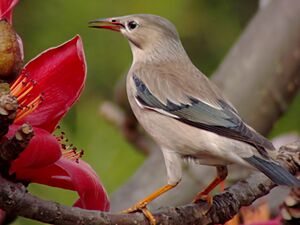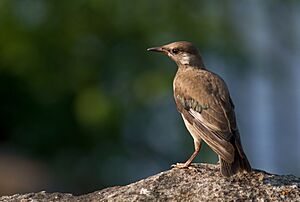Red-billed starling facts for kids
Quick facts for kids Red-billed starling |
|
|---|---|
 |
|
| Conservation status | |
| Scientific classification | |
| Genus: |
Spodiopsar
|
| Species: |
sericeus
|
| Synonyms | |
|
Sturnus sericeus |
|
The Red-billed Starling (scientific name: 'Spodiopsar sericeus') is a type of starling, which is a family of birds called Sturnidae. You can find these birds living in southern and southeastern China.
Contents
About the Red-billed Starling
The Red-billed Starling is known for its bright red beak, which gives it its name. These birds are part of a larger group of birds called starlings. They are often seen in groups, flying and looking for food.
How Scientists Name Birds
The First Description
The Red-billed Starling was first officially described in 1789. A German scientist named Johann Friedrich Gmelin wrote about it. He included it in his updated version of a famous book called Systema Naturae by Carl Linnaeus.
Gmelin gave the bird its first scientific name: Sturnus sericeus. This type of two-part name is called a binomial name. The word sericeus comes from Medieval Latin and means "silken."
Where the Name Came From
Gmelin learned about this bird from an earlier description. An English scientist named Peter Brown had described and drawn the "silk starling" in 1776. Brown saw a specimen (a preserved example) of the bird that belonged to a collector named Marmaduke Tunstall.
Changing Bird Families
For a long time, the Red-billed Starling was placed in the bird group (called a genus) named Sturnus. However, in 2008, scientists did a special study using DNA information. They found that the Sturnus group was not as simple as they thought.
To make the bird groups more accurate, the Red-billed Starling was moved. It, along with the white-cheeked starling, now belongs to a different genus called Spodiopsar. This group was first suggested by Richard Bowdler Sharpe in 1889. The Red-billed Starling is a single species, meaning there are no different types (or subspecies) of it.



